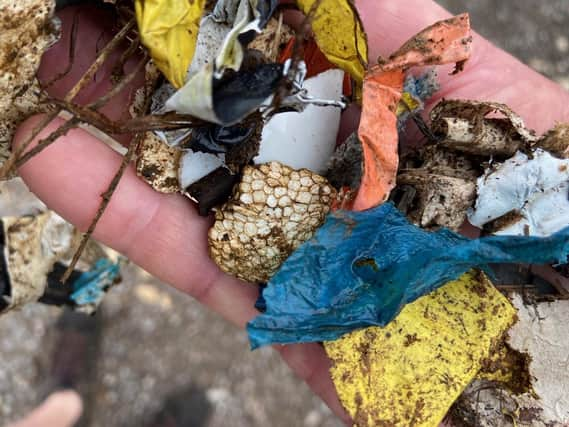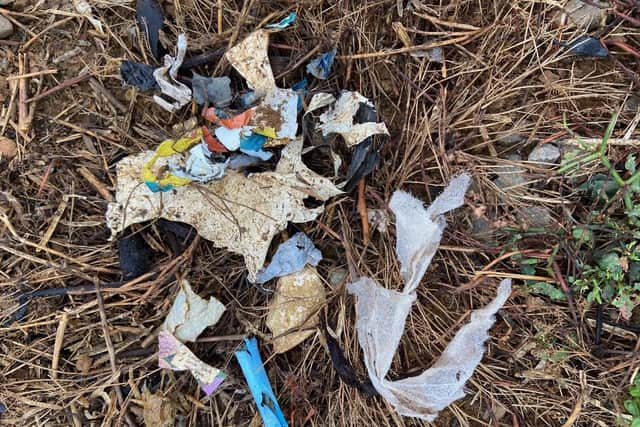Plea to separate waste properly as plastics found in Banbury area field


A Banburyshire dog walker has expressed outrage at the amount of plastic being left in compostable waste and spread on farmland.
The man, who does not want to be named, has likened the spread of thousands of pieces of plastic on fields to the scandal of plastics in the oceans highlighted by Sir David Attenborough.
Advertisement
Hide AdAdvertisement
Hide AdWhile walking his dog along a footpath on a south Northamptonshire field near Banbury, he saw that a large arable field had been spread with compost. Seeing specks of colour he looked closer to find countless pieces of shredded plastic wrapping, pieces of plastic wire covering and even a toothbrush and child's toy.


"Apparently this has been going on for years and it all goes back to householders, canteens and businesses who don't sort out the waste they put into their recycle bins," said the man.
"Apparently the big recycle processors sterilise the waste and create this compost to sell to farmers who are trying to add organic matter to their fields instead of more and more chemical fertilisers.
"But the waste processors can't sort out all the plastics so they get left in the waste as it is being broken dwn. As we know, plastics do not break down for many years. I was outraged when I saw this. Within the space of less than one square metre I picked up a large handful of plastic pieces and thus a previously pristine field has now been coated in a layer of plastic and it's not the farmer's fault.
Advertisement
Hide AdAdvertisement
Hide Ad"People are rightly furious about plastics in the oceans, shown up by Sir David Attenborough, and this is the same, but on the land."
It is understood the inclusion of plastics in waste for compost has actually improved over recent years. However it is extremely difficult and costly to remove all plastics. What is needed is for waste to be separated correctly where it is binned.
"It is my view that there should be an inspection of compost to certify it plastic free. If it contains any plastic at all it should be deemed unfit for agricultural use and disposed of safely. If not, farmers across the nation will be unwittingly spreading vast quantities of what is, to nature, toxic waste across the countrysid, and thus spread the problem of plastic in our hedgerows and water courses to all parts of our countryside. It’s basically rubbish mixed in with compost," the man said.
"A friend who is an agronomist - an expert in the science of soil management and crop production - told me the plastic is entirely due to people putting inappropriate waste into the compost bins, and the council or private companies contracted by them don’t have the equipment to separate it.
Advertisement
Hide AdAdvertisement
Hide Ad"The councils have quotas for recycling, including compost, and the farmers are trying to do the right thing by feeding the soil with organic matter. My friend said he was picking cutlery off a field the other day with the farmer because a caterer had dumped everything in the compost bin, knives, forks and all.
"The alternative would be for this to go to landfill, however landfill is a huge problem too, and hugely expensive. There is seemingly no solution to this issue, except for people to realise the damage they are doing and stop discarding plastic in the compost bins."
An Oxfordshire County Council spokesman said the fields in question were not spread with compost made from Oxfordshire facilities.
In a joint statement with Cherwell District Council, the authorities said: "Garden waste and mixed food and garden waste collected from Oxfordshire residents is treated at open windrow and in-vessel composting facilities in Oxfordshire. The process produces a soil conditioner that is subject to rigorous screening to remove contamination before it is made available for use by local farmers. The compost produced is PAS100 certified, which is a national quality standard.
Advertisement
Hide AdAdvertisement
Hide Ad“The best way to prevent contamination is to avoid plastics and metal items going into the green waste in the first place. We ask residents to make sure they put their waste in the right bins, and to take care not to put plastic bags, plant labels and pots in their garden waste, or accidentally lose their cutlery in their food waste.”
South Northamptonshire Council runs excellent recycling services for households in the district and has one of the highest recycling rates in England. As with all recycling services it is important that people put the right things in the right bins so that the contents can be recycled correctly.
The green bins are for garden waste only such as grass, leaves, branches and weeds. The garden waste is taken to a local facility and turned into compost to be used on farmers fields. No plastic should go into the green bins as this could end up in the finished compost.
The blue recycling bins are for glass bottles and jars, card, paper, cans, tins, foil, aerosols, plastic pots, tubs and trays and plastic bottles. The contents are sorted at the recycling facility in Leicester and turned into new products. We ask residents to make sure that they only put the right things in the blue bins – if in doubt check the council website for a list of what to put in.
Advertisement
Hide AdAdvertisement
Hide AdThe silver caddies are for food waste with a large one to put out for a collection and a small one provided for storage indoors. These are collected weekly and the food is turned into electricity and a soil conditioner.
For more information on what goes in each bin and what happens to it please check the Council website: https://www.southnorthants.gov.uk/wasteandrecycling